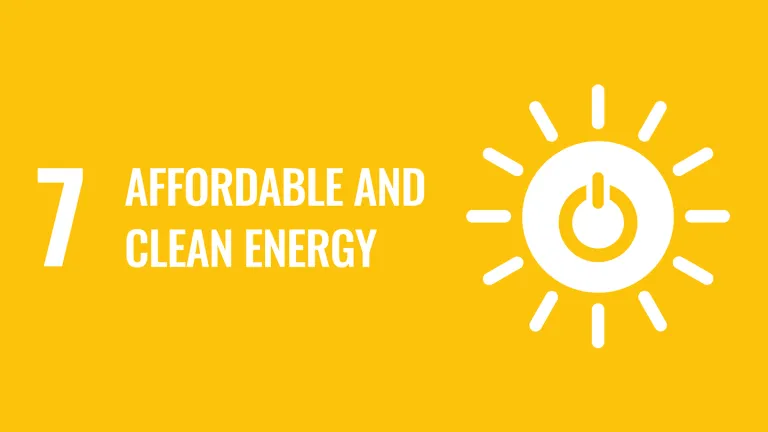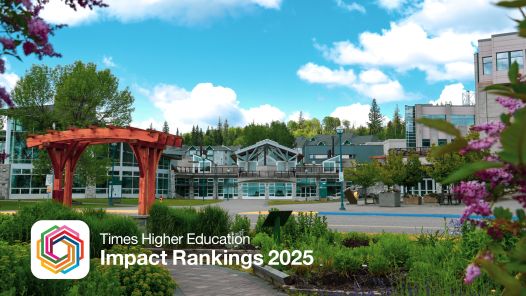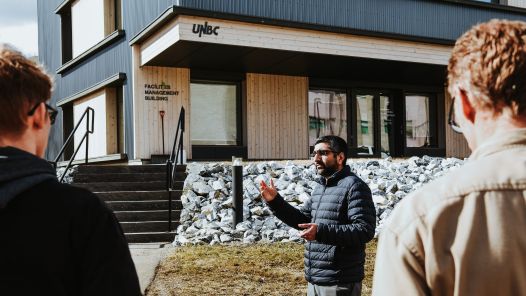
"Ensure access to affordable, reliable, sustainable and modern energy."
As Canada’s Green University, the main campus was designed with the intent to minimize energy consumption and impact on the environment – to be a sustainable campus. This included such features as green roofs, building connectivity, and natural lighting throughout most buildings. Wood construction was employed in many buildings to reduce energy consumption in construction. As technologies have improved, UNBC has upgraded its facilities, including the use of a bio-energy plant to provide heating during winter months and a retrofit of all light fixtures to minimize electrical consumption. UNBC engages in research intended to support the introduction of clean, renewable energy in its entire region and beyond.
New UNBC buildings have been (e.g. Wood Innovation Design Centre, Wood Innovation Research Laboratory) and will be (e.g. New Residences, Daycare facilities) designed to meet Passive House standards and the highest level of the LEED rating system.
Energy Management Program
With raised awareness of the environmental impacts of energy use, the University of Northern British Columbia has committed to minimizing its environmental impact by reducing energy consumption, and showcasing renewable and efficient energy systems that are of particular interest to northern and remote communities, while supporting its mandate of teaching and research.
In addition to minimizing the environmental impacts of operating UNBC facilities, decreasing energy use and switching to renewable energies stabilizes operating costs and reduces the impact of increasing energy rates. For example, over the past five years electricity prices have risen 40%, however due to the Energy Management initiatives UNBC decreased electricity use by 13% which resulted in just a 16% increase in electricity costs.
UNBC has completed dozens of energy efficiency projects over the past 11 years which have helped us reduce our electricity use by 40% and natural gas consumption by 24% from the 2010 baseline, resulting in utility cost savings of $3.2 million and $2.6 million respectively. UNBC has prepared a Strategic Energy Management Plan (SEMP) for each financial year since 2011-12 with energy reporting included for the previous financial year.
Wood Pellet Project
In the spring of 2009, UNBC installed Canada’s first university-owned wood pellet heating system. With much higher energy efficiency than the previous fossil fuel-based heating system, this project reduces emissions by 140 tons of CO2/year. The facility also serves as a valuable demonstration site for public education, with more than 700 political leaders, industry officials, and community residents visiting during the first year alone.
Biomass Gasification Project
UNBC’s biomass gasification system began heating the Prince George campus in March 2011. The system supplies heat to the core campus buildings and offsets about 85% of previous fossil fuel consumption. This $15 million project was funded by the federal and provincial governments, and hog fuel is provided by Lakeland sawmill located in Prince George. In addition to being carbon-neutral, the cost of acquiring hog fuel is only about 35% of the cost of natural gas.
UNBC’s bioenergy plant won the Best Campus Case Study Award from The Association for the Advancement of Sustainability in Higher Education (AASHE) in 2011. The plant is also certified to the prestigious LEED Platinum standard and emits among the lowest emissions of any bioenergy plant in North America. As an additional sustainability benefit of the Bioenergy Plant, ash resulting from the process is collected and used as a fertilizer at a local farm.
Free cooling #
Our facilities staff has identified several opportunities to bring in cool outdoor air rather than run air conditioners to keep campus electrical equipment cool. Working with the Energy Manager and local engineering consultants, we have been able to implement these initiatives to save both electricity and potable water for cooling. A recent example is the free cooling project that was completed in 2020 for the data centre in the Administration Building.
Sustainable communities demonstration project #
In 2014, UNBC began work on the Sustainable Communities Demonstration Project (SCDP), which further expanded our bioenergy supply on campus. The SCDP involved installing a low-temperature district heating system that connected our student housing, daycare, Enhanced Forestry Lab, and take-offs for future buildings, with the existing biomass gasification plant. The SCDP is built with future expansion in mind; opportunities such as installing low-temperature heating options (e.g. geothermal), or a food producing greenhouse may be achievable with this new infrastructure.
The SCDP became operational in September 2016, when the first of UNBC’s student housing was switched over to bioenergy. In the summer of 2017, UNBC’s second housing building and the daycare were also switched over to bioenergy.
Lighting upgrades
UNBC has completed several lighting upgrade projects in partnership with BC Hydro since the Energy Management program began in 2010. Lighting upgrades are done by area, where significant savings are obtained from replacing older technology such as fluorescent tubes with LED lighting. In addition, motion sensors, scheduling, and network controls are integrated as part of these upgrades to optimize energy savings.
Continuous optimization #
Working with BC Hydro and an external consultant, UNBC has seen significant energy reductions through the Continuous Optimization Program. The program involves investigating existing building systems to identify opportunities for optimization and energy savings. The first round of the program took place between 2013 and 2017, tackling nine buildings on campus. Eight of those nine buildings were selected for a second round of the program, which was completed in 2023.
Heat exchanger upgrades
UNBC is undertaking a multi-year series of heat exchanger upgrade projects. The main intent of the projects is to replace aging inefficient heat exchanger systems with newer more efficient systems. This entails replacing large inefficient plate-and-frame heat exchangers with smaller, more efficient brazed plate heat exchangers. Additionally, this often entails replacing large inefficient fixed speed pumps with fewer, smaller variable speed drive pumps. The redesigns can also entail decoupling systems so that they can be run independently, so for example, a pump can be switched off if its system is off where previously it might have been running all the time. The projects have also allowed for more efficient yet robust piping design, while also being maintenance friendly. All these tweaks, large and small, for each system that is upgraded, ultimately improve the efficiency of each system which will then result in less electricity and fuel demand. An additional important benefit is the lowering of the return water temperature (by allowing more heat transfer through temperature differential rather than higher flow rate) – it is anticipated that the lower return temperature will allow for the use of the primary district water loop for heat recovery.
Electrification
UNBC continues to investigate and implement electrification projects to help reduce fossil fuel consumption. A recent example that was completed was the installation of a hybrid heat pump system in the Maintenance Building in March 2024 to replace the previous aging and inefficient propane furnace. The heat pump will be used for cooling and heating, only backed up by propane in very cold ambient temperatures.
UNBC
Solar panels
UNBC has 25 solar panels (16 of which were donated from the Highglen Montessori Elementary School and School District 57) on the roof of the Conference Centre (Building 6) which produces roughly 5000 kilowatts of electricity per year which is about $1100 worth of electricity. On a good day with maximum sunshine, it can power 145 laptops at one point in time. Most houses use roughly 10,000 kwh over the course of a year.
Sustainability in action at UNBC
Upcoming events
11
NovEnergy Transition Group Meeting
Tuesday6:30 p.m. to 8:00 p.m.
Online, Prince George campusUNBC Prince George Location Rm 5-154
22
Nov09
DecEnergy Transition Group Meeting
Tuesday6:30 p.m. to 8:00 p.m.
Online, Prince George campusUNBC Prince George Building 5 Room 5-175
Explore the SDGs
UNBC is committed to advancing the United Nations Sustainable Development Goals (SDG) through a wide range of initiatives aimed at fostering sustainability, inclusivity, and global responsibility.


